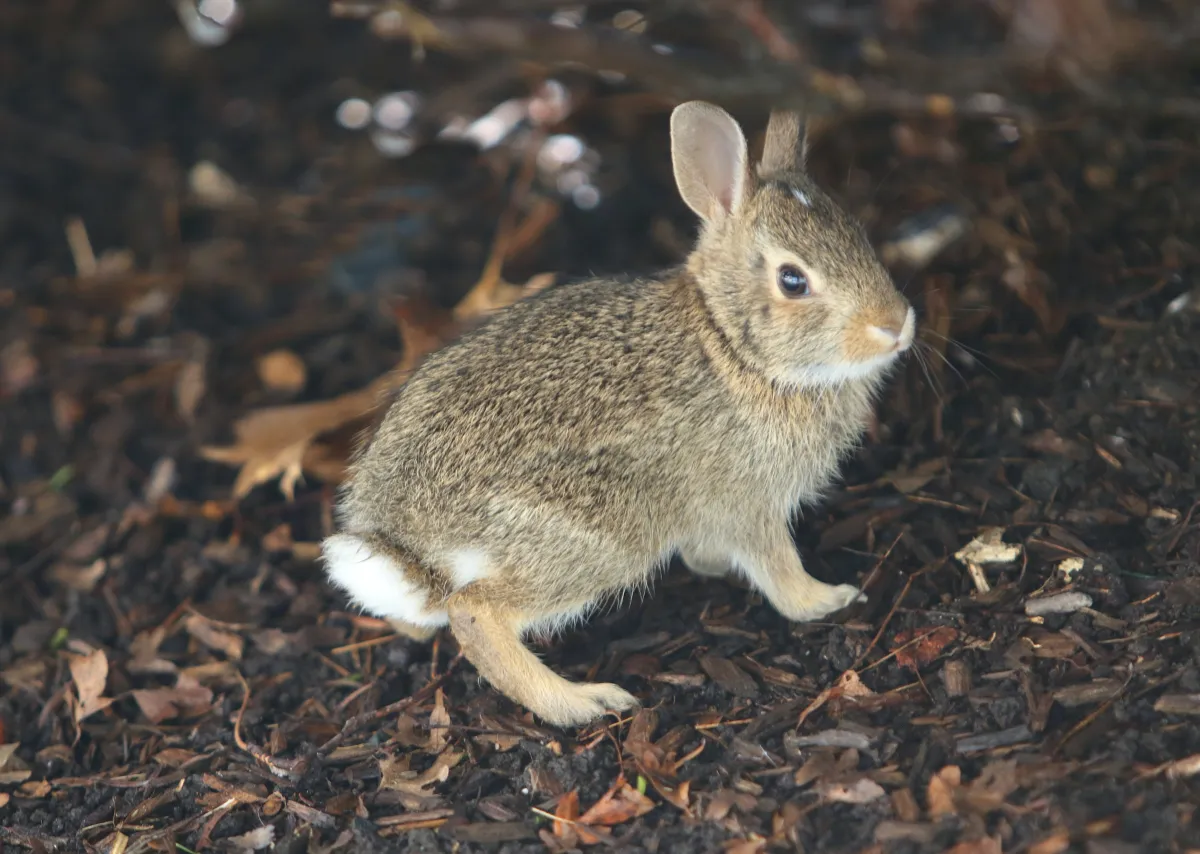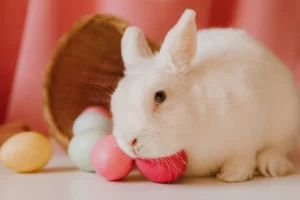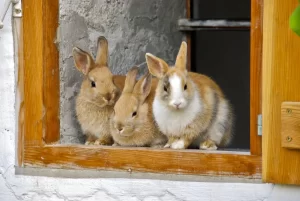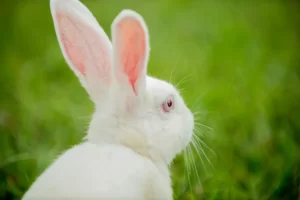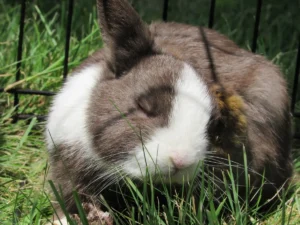Are you concerned about your rabbit grinding its teeth? Don’t worry, you’re not alone. Teeth grinding in rabbits is a common behavior that can have various causes.
In this article, we’ll explore the possible reasons behind your furry friend’s teeth grinding. From dental issues to stress and medical conditions, we’ll cover it all. By understanding the underlying factors, you’ll be better equipped to address your rabbit’s needs and ensure their overall well-being.
Let’s dive in and find out why your rabbit may be grinding its teeth.
In This Article
- 1 Key Takeaways
- 2 Dental Issues
- 3 Pain or Discomfort
- 4 Stress or Anxiety
- 5 Malocclusion
- 6 Nutritional Imbalances
- 7 Behavioral Causes
- 8 Environmental Factors
- 9 Medical Conditions
- 10 Frequently Asked Questions
- 10.1 Can Dental Issues in Rabbits Cause Other Health Problems?
- 10.2 Can Stress or Anxiety in Rabbits Lead to Teeth Grinding?
- 10.3 Are There Any Specific Medical Conditions That Can Cause Rabbits to Grind Their Teeth?
- 10.4 How Can I Determine if My Rabbit’s Teeth Grinding Is Due to a Behavioral Cause?
- 10.5 Are There Any Environmental Factors That Can Contribute to Teeth Grinding in Rabbits?
Key Takeaways
- Dental issues and prevention are crucial for maintaining overall dental health in rabbits.
- Regular check-ups with a rabbit dental care specialist and providing a diet with plenty of hay help prevent dental problems.
- Teeth grinding in rabbits can indicate pain or discomfort, and regular dental checks are important to identify overgrowth or abnormalities.
- Stress, anxiety, boredom, and frustration can also cause teeth grinding in rabbits, and providing a calm and stimulating environment can help alleviate these behavioral factors.
Dental Issues
Do you notice any pain or discomfort when chewing due to dental issues?
Dental problems can be a common issue for rabbits and can cause them significant discomfort. One key dental issue that rabbits may experience is tooth grinding, which is characterized by the sound of their teeth rubbing together.
Tooth grinding prevention is essential to ensure the overall dental health of your rabbit. Regular dental care for rabbits is crucial and involves providing them with a proper diet that includes plenty of hay to chew on. Hay helps to wear down their teeth naturally and prevents the overgrowth that can lead to dental issues.
Additionally, regular check-ups with a veterinarian who specializes in rabbit dental care is recommended to address any dental problems early on.
Pain or Discomfort
You may experience occasional pain or discomfort when your rabbit’s teeth are grinding together. This behavior, known as teeth grinding or bruxism, can be a sign of stress or dental issues. Stress management and dental care are crucial for your rabbit’s overall well-being.
To better understand how to address this issue, let’s take a closer look at stress management and dental care for rabbits.
| Stress Management | Dental Care |
|---|---|
| Provide a quiet and calm environment for your rabbit. | Regularly check your rabbit’s teeth for any signs of overgrowth or abnormalities. |
| Offer plenty of enrichment activities to keep your rabbit mentally stimulated. | Provide a balanced diet consisting of hay, fresh vegetables, and a small amount of pellets. |
| Avoid sudden changes in your rabbit’s routine or environment. | Schedule regular veterinary check-ups to ensure proper dental health. |
| Spend quality time with your rabbit, providing gentle petting and companionship. | Offer chew toys and safe objects for your rabbit to gnaw on to help wear down their teeth naturally. |
Stress or Anxiety
Managing stress and anxiety is essential for maintaining your rabbit’s overall well-being. Rabbits can experience stress and anxiety due to various factors, such as changes in their environment, lack of social interaction, or loud noises. It’s important to recognize the signs of stress and anxiety in your rabbit, such as teeth grinding, excessive grooming, or aggression.
To help your rabbit cope with stress and anxiety, there are several coping mechanisms you can try. Providing a safe and secure environment, with hiding places and toys, can help reduce stress. Additionally, maintaining a routine and providing regular social interaction can help alleviate anxiety.
If your rabbit’s stress and anxiety persist, it’s important to consult a veterinarian. They can provide guidance on treatment options, such as behavioral therapy or medication. Behavioral therapy may involve desensitization techniques or positive reinforcement training. Medication, such as anti-anxiety or anti-depressant medications, may be prescribed in severe cases.
Malocclusion
If your rabbit is experiencing malocclusion, it’s important to seek veterinary care as soon as possible. Malocclusion refers to teeth misalignment in rabbits, which can lead to severe jaw problems.
Rabbits have continuously growing teeth, and when they don’t wear down properly, it can result in overgrown teeth that don’t align correctly. This can cause pain, difficulty eating, and even abscesses.
A veterinarian will be able to assess the severity of the malocclusion and recommend the best course of action. Treatment options may include filing or trimming the teeth, providing a specialized diet, or in more severe cases, extracting the affected teeth.
Early intervention is crucial to prevent further complications and ensure your rabbit’s well-being. Don’t hesitate to seek veterinary care if you notice any signs of teeth misalignment in your rabbit.
Nutritional Imbalances
Sometimes, feeding your rabbit a balanced diet can help prevent nutritional imbalances that may contribute to teeth misalignment. Proper nutrition plays a crucial role in maintaining your rabbit’s overall health, including their dental health. Here are some important points to consider:
- Dietary deficiencies: A lack of essential nutrients like calcium, vitamin D, and fiber can lead to weakened teeth and jawbones, increasing the risk of teeth grinding and misalignment.
- Digestive disturbances: An unhealthy digestive system can affect your rabbit’s ability to absorb nutrients properly, which can result in nutritional imbalances and subsequently impact their dental health.
- Fiber-rich diet: Providing your rabbit with a diet high in hay, fresh vegetables, and limited amounts of pellets can help maintain healthy teeth and prevent dental issues.
- Regular vet check-ups: Regular visits to your veterinarian can ensure that your rabbit’s diet is well-balanced and meet their specific nutritional needs.
Behavioral Causes
You can address behavioral causes of teeth grinding in your rabbit by observing their environment and providing appropriate enrichment activities. Rabbits may grind their teeth due to anxiety, boredom, or frustration. By implementing training techniques and socialization methods, you can help alleviate these behaviors and promote a healthier environment for your furry friend.
| Training Techniques | Socialization Methods | Enrichment Activities |
|---|---|---|
| Positive reinforcement | Introducing your rabbit to new experiences | Providing chew toys and tunnels |
| Clicker training | Allowing supervised interaction with other rabbits | Creating a safe and secure space |
| Target training | Encouraging exploration and play | Offering a variety of textures to chew on |
Environmental Factors
Make sure to assess the temperature, humidity, and lighting in your rabbit’s living space, as these environmental factors can greatly impact their overall health and well-being. It’s important to create a comfortable and suitable environment for your rabbit to thrive. Here are some key factors to consider:
- Cage size: Ensure that your rabbit has enough space to move around comfortably. A larger cage allows for more exercise and promotes good mental and physical health.
- Temperature control: Rabbits are sensitive to extreme temperatures. Keep the living space well-ventilated and maintain a temperature between 60-70°F (15-21°C). Avoid placing the cage in direct sunlight or near drafts.
- Humidity: Maintain a moderate level of humidity between 40-60%. Too much moisture can lead to respiratory issues, while low humidity can cause dry skin and eyes.
- Lighting: Provide natural daylight or use artificial lighting to mimic it. This helps regulate their internal clock and promotes a healthy sleep-wake cycle.
Medical Conditions
If your rabbit starts displaying unusual behaviors or symptoms, it’s important to seek veterinary advice, as medical conditions can often be the underlying cause. One concerning behavior that rabbit owners may notice is teeth grinding. Teeth grinding, also known as bruxism, can indicate a variety of medical conditions in rabbits. It’s crucial to identify and address the root cause of this behavior to ensure the well-being of your furry friend.
When it comes to treatment options, the first step is to consult a veterinarian who specializes in exotic animals. They’ll conduct a thorough examination to determine the cause of the teeth grinding. Treatment may vary depending on the underlying condition, but it can include pain management, dental procedures, or medication.
Prevention strategies for teeth grinding in rabbits involve maintaining proper dental health. This includes providing a diet rich in hay and fresh vegetables, as well as regular check-ups with a veterinarian. Additionally, providing appropriate toys and environmental enrichment can help prevent stress-related teeth grinding.
Frequently Asked Questions
Can Dental Issues in Rabbits Cause Other Health Problems?
Dental issues in rabbits can definitely cause other health problems. When a rabbit grinds its teeth, it may indicate dental health issues, which can impact their overall well-being.
Can Stress or Anxiety in Rabbits Lead to Teeth Grinding?
Feeling stressed? Your rabbit might be too! Stress can cause teeth grinding in rabbits. It’s important to address the underlying cause of stress and provide management techniques to alleviate pain and ensure your rabbit’s well-being.
Are There Any Specific Medical Conditions That Can Cause Rabbits to Grind Their Teeth?
Medical conditions and dental issues can cause rabbits to grind their teeth. It’s important to consult a veterinarian to determine the exact cause and provide appropriate treatment for your rabbit’s dental health.
How Can I Determine if My Rabbit’s Teeth Grinding Is Due to a Behavioral Cause?
To determine if your rabbit’s teeth grinding is due to a behavioral cause, start by scheduling a dental examination. A veterinarian can identify any dental issues or signs of pain that may be causing the grinding.
Are There Any Environmental Factors That Can Contribute to Teeth Grinding in Rabbits?
Environmental factors, such as a poor living environment or high levels of stress, can contribute to teeth grinding in rabbits. Additionally, diet quality plays a role, as insufficient roughage can lead to dental issues.

